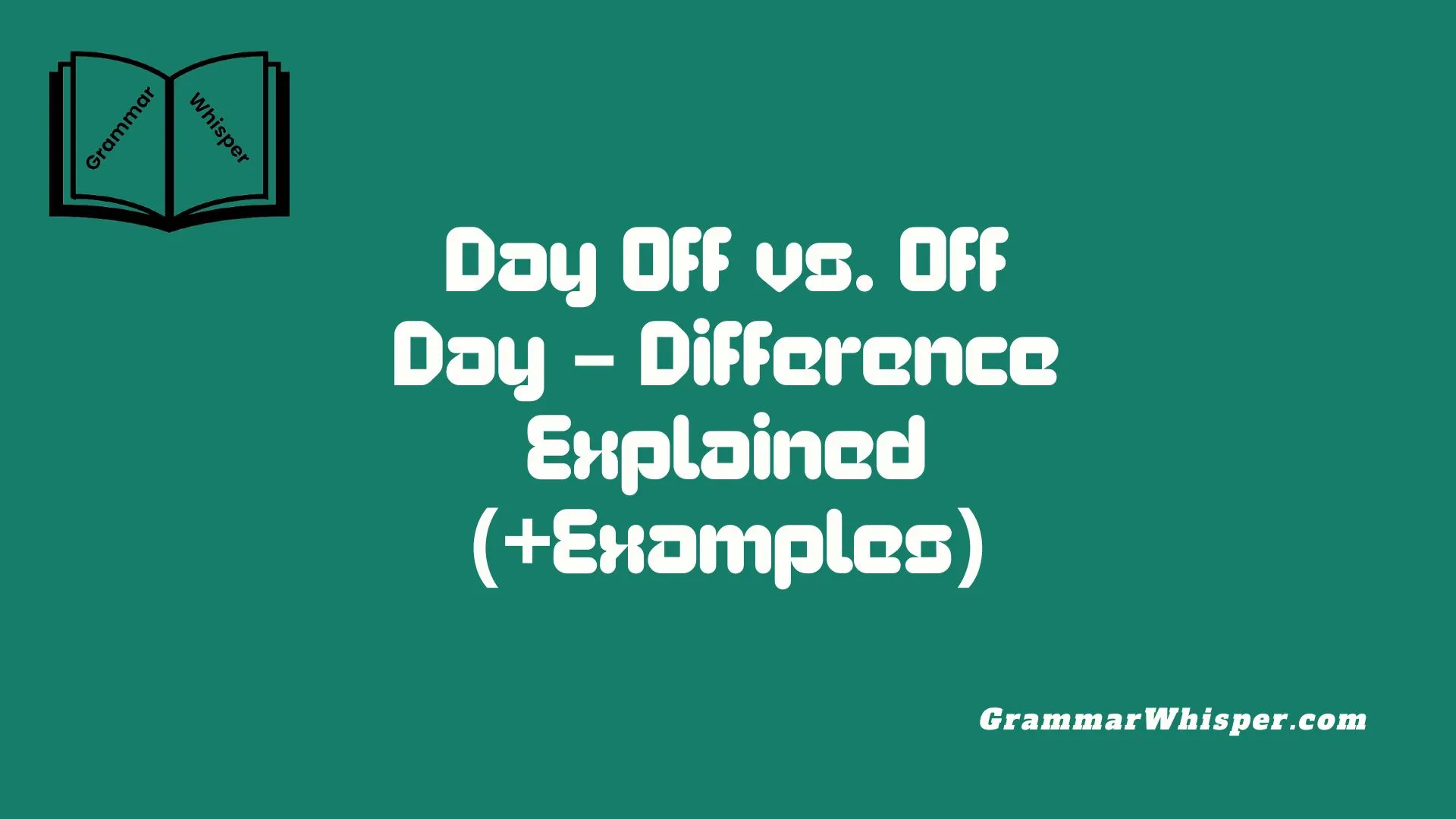As a language coach working closely with native speakers and new learners, I’ve seen the phrases “Day Off vs. Off Day” misused time and again. They might sound similar, but the meaning, use, and intent are worlds apart. A day off is a planned break – a chance to skip work, enjoy a vacation, or simply relax. An off day, in contrast, is about a dip in your mood or performance. You show up, but nothing feels right. Getting that difference right matters – just one wrong sentence can give off the wrong vibe, especially in professional settings.
To explain the gap clearly, I like using tools like tables, case studies, and visual comparisons – they make the concept stick. I also guide students with breakdowns of real-life examples to show how these expressions naturally appear in context. A solid guide like this helps learners avoid common mistakes, especially when writing emails or having casual conversations. Think of it this way: “I took a day off” = break time. “I’m having an off day” = still working, just not your sharpest.
Why “Day Off” and “Off Day” Confuse So Many People
English is full of expressions where just a word order flip changes everything. “Day off” and “off day” are perfect examples.
Although both contain the same words, they don’t mean the same thing:
- “Day off” = A planned break from work.
- “Off day” = A day when things go wrong or you’re not at your best.
People often misuse them because they sound similar, and both involve “not working.” But the reason you’re not working is what changes the meaning.
“Word order matters. In English, flipping two words can completely change the message.”
Let’s break each phrase down clearly.
Definitions and Core Differences: At a Glance
Here’s a quick reference table to highlight the contrast between these phrases.
| Phrase | Definition | Emotional Tone | Common Contexts | Example Sentence |
| Day off | A planned or scheduled break from work or duties | Positive / Neutral | Work, school, healthcare | “I’m taking a day off tomorrow.” |
| Off day | A day when someone performs poorly or feels “off” emotionally or mentally | Negative / Frustrated | Sports, work, mental health | “I’m having an off day at work.” |
✅ Think of “day off” as permissioned rest and “off day” as unplanned struggle.
What Does “Day Off” Really Mean?
A day off refers to any day a person intentionally takes away from their regular duties – typically work. It’s often used in relation to:
- Paid leave (PTO)
- Personal time
- Public holidays
- Medical or mental health days
Examples of “Day Off” Usage:
- “I’ve scheduled a day off to attend my cousin’s wedding.”
- “She gets two days off a week.”
- “Tomorrow is my day off. Don’t call me.”
Tone & Implication
- Usually positive or neutral.
- Implies a break from responsibility.
- Doesn’t suggest anything is wrong – just rest or time off.
Grammatical Use
- Countable noun (You can have a day off or two days off).
- Usually comes after verbs like take, have, get, request.
When and How to Use “Day Off” in Sentences
Here are the most common sentence structures for “day off”:
| Structure Type | Example Sentence |
| Requesting | “Can I take a day off next Friday?” |
| Describing | “I’m on my day off today.” |
| Scheduling | “She has a day off every second Monday.” |
| Using in HR emails | “Employees are entitled to 15 paid days off per year.” |
Synonyms for “Day Off”
- Paid leave
- Vacation day
- Personal time
- Mental health day
- PTO (Paid Time Off)
“Day off” is always intentional and often welcome. It gives people time to recharge.
What Does “Off Day” Mean?
In contrast, an off day refers to a time when someone isn’t functioning at their usual level. It could mean low energy, making mistakes, feeling mentally sluggish, or underperforming.
It’s most often used to talk about:
- Poor performance at work or school
- Mental fatigue
- Athletic underperformance
- Emotional burnout
Examples of “Off Day” Usage:
- “I don’t know what’s wrong – I’m just having an off day.”
- “Even Serena Williams has off days.”
- “His report was full of errors. Must’ve been an off day.”
When and How to Use “Off Day” in Sentences
Here are typical ways “off day” shows up in speech and writing:
| Structure Type | Example Sentence |
| Performance-based | “The pitcher had an off day and gave up five runs.” |
| Mental/emotional | “I’m not myself today – just an off day, I guess.” |
| Casual usage | “Ugh, it’s been an off day from the start.” |
Synonyms for “Off Day”
- Bad day
- Low day
- Not feeling it
- Not on my game
- Out of sorts
“Off day” implies something unexpected went wrong – even if you tried your best.
Key Contextual Differences Between “Day Off” and “Off Day”
Let’s break it down by purpose, emotion, and control:
| Feature | Day Off | Off Day |
| Planned or Unplanned | Planned | Unplanned |
| Emotional Tone | Positive / Relaxed | Negative / Frustrated |
| Used In | HR, calendars, time-off requests | Sports, work stress, emotional health |
| Reason | Rest, holiday, leave | Fatigue, stress, poor performance |
| Is it a break from work? | Yes | Not necessarily |
Venn Diagram Summary:
- No overlap in meaning, despite same words.
- Context completely changes interpretation.
Common Mistakes People Make
Mistake #1: Saying “off day” when you mean vacation ❌ “I’m taking an off day tomorrow.” ✅ Correct: “I’m taking a day off tomorrow.”
Mistake #2: Thinking “day off” means being unproductive ❌ “I had a day off and I wasn’t myself.” ✅ Correct: “I had an off day and couldn’t focus.”
Mistake #3: Mixing them in professional settings Avoid saying “off day” in formal leave requests.
Real-Life Examples: “Day Off” in Context
Workplace Email:
Subject: Request for Day Off “Hi Karen, I’d like to request a day off on Tuesday, June 12th to handle a personal matter.”
Social Media:
“Finally got a day off after three weeks straight. Time for Netflix and snacks.”
News Example:
“Employees are expected to receive additional paid days off under the new policy.”
Real-Life Examples: “Off Day” in Context
Sports Coverage:
“LeBron had an off day, missing 8 out of 10 free throws.”
Mental Health Blog:
“Having an off day doesn’t mean you’re broken – it just means you’re human.”
Casual Conversation:
“I can’t focus on anything today. Total off day.”
Alternative Phrases for “Day Off”
Here are better-suited phrases depending on the tone or context:
| Term | Best Used When… |
| Paid Leave | Formal, HR documents |
| Vacation Day | Long-term absence, traveling |
| Mental Health Day | Needing rest for emotional wellbeing |
| Personal Time | Broad, professional tone |
| Break | Informal conversations |
Substitutes for “Off Day”
“Off day” can be expressed in many creative or idiomatic ways:
| Alternative Phrase | Tone | Use Case |
| “Off my game” | Casual | Sports, work |
| “Not myself” | Neutral | Emotional, mental fatigue |
| “Having a rough one” | Informal | General bad day |
| “Everything’s off” | Broad | Chaos or dysfunction |
Native Speaker Insights
- “Day off” is widely used in both American and British English.
- “Off day” is more informal but still accepted globally.
- In some cultures, “day off” might refer to religious or community-based breaks (e.g., Jumu’ah or Sabbath).
- Professional environments avoid using “off day” because it lacks clarity.
“When in doubt, think: Is this a rest day or a rough day?”
Final Thoughts
(A visual comparison is ideal here – consider uploading a downloadable version for readers.)
How to Politely Ask for a Day Off at Work
Sample Email Template:
Subject: Request for Day Off “Hi [Manager’s Name], I hope you’re well. I’d like to request a day off on [date] for [brief reason, if necessary]. Please let me know if this works or if you need further details. Best regards, [Your Name]”
FAQs
Can you use “off day” to mean vacation?
No. “Off day” refers to underperformance or not feeling well. Use “day off” for planned rest.
Is “off day” slang?
It’s informal but widely understood in standard English.
Can you say “I’m taking an off day”?
Grammatically yes, but it sounds confusing. It’s better to say “I’m taking a day off.”
Is “day off” always work-related?
Mostly, but it can also refer to school or other obligations.











